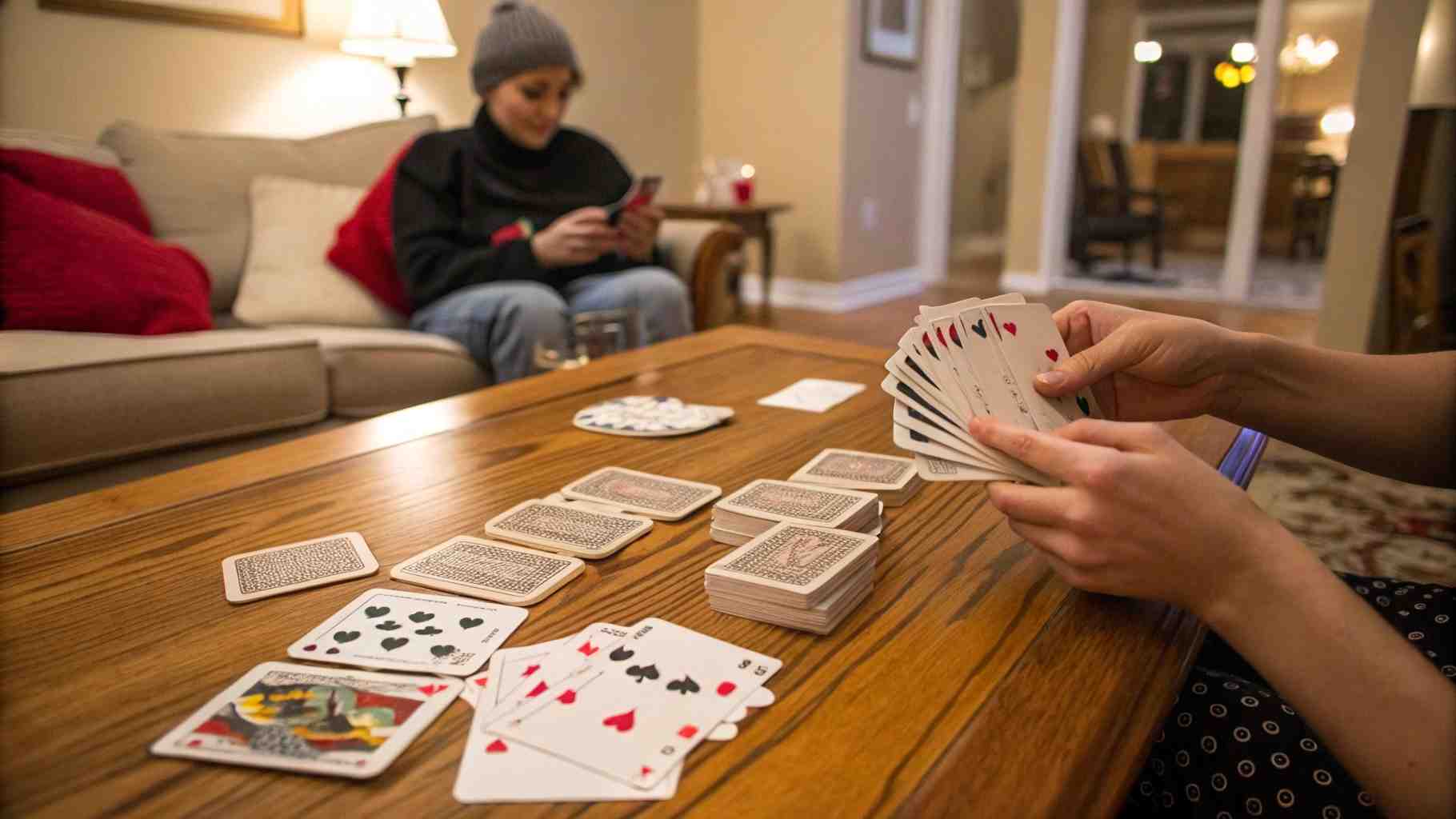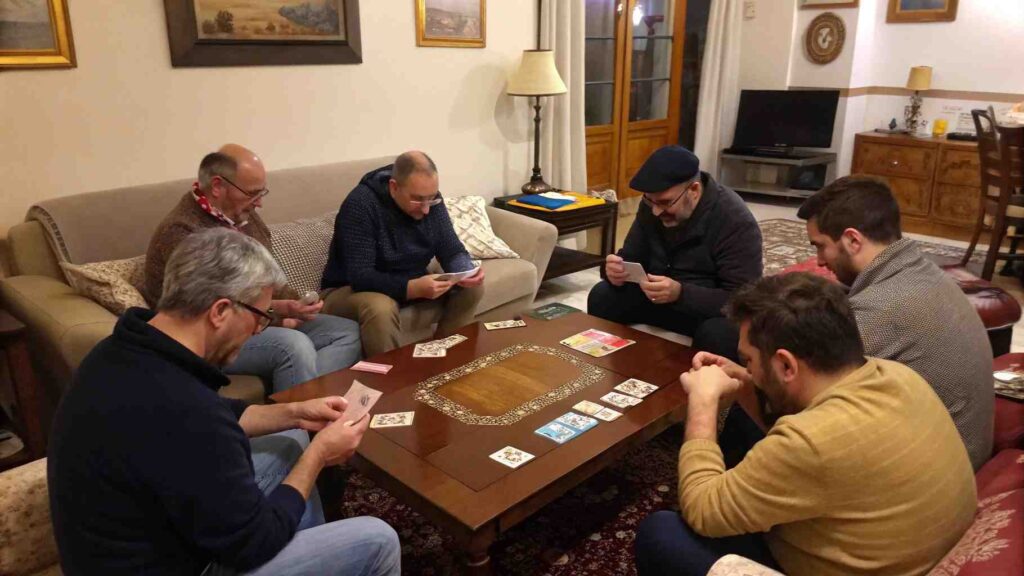
Hand and Foot card game is a fun and simple card game where players use two sets of cards—first their hand, then their foot—to make groups and score points. It’s great for families and friends to play together.
Stay tuned with us—we’ll soon dive into tips, tricks, and exciting variations of the Hand and Foot card game to help you level up your play and have even more fun!
What Is the Hand and Foot Card Game?
Hand and Foot is a multi-deck card game that’s typically played by four to six players, often in teams of two or three. Like its cousin Canasta, it revolves around forming melds—sets of three or more cards of the same rank. However, it ups the ante by having each player manage two hands: the “hand” and the “foot.”
The challenge? You must first play through your hand before moving to your foot—adding layers of planning, timing, and strategy.
A Brief History of Hand and Foot
The exact origins of Hand and Foot remain unclear, but it’s believed to have developed in the United States during the mid-20th century. Some consider it a homemade variation of Canasta, a game that soared in popularity after its invention in Uruguay in 1939.
As Hand and Foot spread through North America, especially in social clubs, RV parks, and senior centers, house rules flourished—leading to dozens of game variations still in use today.
How Many People Can Play Hand and Foot?

The game scales beautifully depending on your group size:
- 2 players: Play head-to-head with simplified rules
- 3 players: Play solo with minor deck adjustments
- 4 players: The standard team format (2 vs. 2)
- 6 players: Two teams of 3
- Even 8 or 10: Play with large teams and more decks
The more players you have, the more decks you’ll need!
What Do You Need to Play?
Here’s your full checklist for a Hand and Foot setup:
| Item | Details |
| Playing Cards | 5–6 standard 52-card decks (with jokers) |
| Pen and Paper | To track points and books per round |
| Playing Surface | A large enough table to hold multiple discard piles |
| Players | Minimum 2, best with 4 or 6 |
Pro Tip: Use card trays if you’re playing with 5+ decks to keep things organized.
Step-by-Step Gameplay
Let’s walk through the phases of a typical Hand and Foot round.
Dealing the Cards
Each player gets:
- 11 cards in the hand (to play first)
- 11 cards in the foot, placed face-down (used after finishing the hand)
The remaining cards go into a draw pile, and one card is flipped to start the discard pile.
You may use pre-made decks or manually deal. Some versions use 13 cards per pile.
Starting the Game
Players take turns clockwise:
- Draw 2 cards
- Meld if able (place 3+ of the same rank on the table)
- Discard 1 card to end their turn
Melds can be:
- Clean (all natural cards)
- Dirty (includes wild cards like 2s and jokers)
When a player runs out of cards in their hand, they pick up their foot and continue playing.
The Goal of the Game
Your team’s ultimate goal is to:
- Create “books” (melds of 7+ cards of the same rank)
- Go out by discarding your last card after your team has met required books
- Score as many points as possible while minimizing penalties
Scoring: How Points Work?
Understanding the scoring system is crucial if you want to win.
Card Point Values:
| Card | Value |
| Jokers | 50 points |
| 2s (wild) | 20 points |
| Aces | 20 points |
| 8-King | 10 points |
| 4-7 | 5 points |
| Black 3s | 5 points (cannot be melded) |
| Red 3s | -500 points (penalty unless discarded immediately) |
Bonus Points:
| Action | Bonus |
| Clean Book | +500 points |
| Dirty Book | +300 points |
| Going Out | +100 points |
| Red 3 not discarded | -500 points each |
Each round, teams tally their meld value, books, and subtract any cards still in hand or foot.
Advanced Strategy Tips
Ready to outsmart your opponents? Try these advanced Hand and Foot strategies:
Use Wilds Wisely
Don’t burn wilds too early—save them for closing books or building dirty melds fast.
Track Opponents’ Melds
Watch what others lay down to gauge how close they are to going out.
Play Defense
Avoid discarding cards that might help your opponents finish their books.
Don’t Go Out Prematurely
Make sure your team has all required books before going out—it could cost you major points.
Popular Variations of Hand and Foot
Progressive Hand and Foot
- Each round gets harder (more books required, higher meld points to start)
- Great for competitive players
Cutthroat Version
- No teams—everyone for themselves
- Requires quicker thinking and defensive play
Double Foot
- Two foot piles instead of one
- Makes for a much longer, more strategic game
Triple Play
- Introduce a third pile (e.g., “hand,” “foot,” and “tail”)
- Adds depth and challenge for experienced players
Sample Scorecard Template:
| Team | Clean Books | Dirty Books | Red 3 Penalty | Bonus (Going Out) | Total |
| Team A | +1000 | +600 | -500 | +100 | 1200 |
| Team B | +500 | +300 | 0 | 0 | 800 |
FAQ’s
1. How long does a game of Hand and Foot take?
A standard 4-round game lasts 1 to 2 hours, depending on player experience and number of players.
2. Can you play Hand and Foot online?
Yes! Websites and apps like Trickster Cards and Canasta Junction offer online versions.
3. What happens if I forget to discard a red 3?
You’re hit with a 500-point penalty per red 3 unless your variation waives it. Always discard red 3s immediately if you’re playing with penalty rules.
4. Can you pick up the discard pile?
Only if you can immediately use the top card to start or add to a meld. You can’t pick up the entire pile.
5. Do you need to discard to go out?
Yes—unless house rules say otherwise. A final discard is generally required.
Conclusion:
Hand and Foot is more than a card game—it’s a test of patience, teamwork, and adaptability. Whether you’re bonding with family, challenging friends, or diving into competitive tournaments, this game delivers endless fun and mental stimulation.
With a bit of practice and the right strategies, you’ll find yourself mastering melds, reading your opponents, and making big plays like a true Hand and Foot champion.







